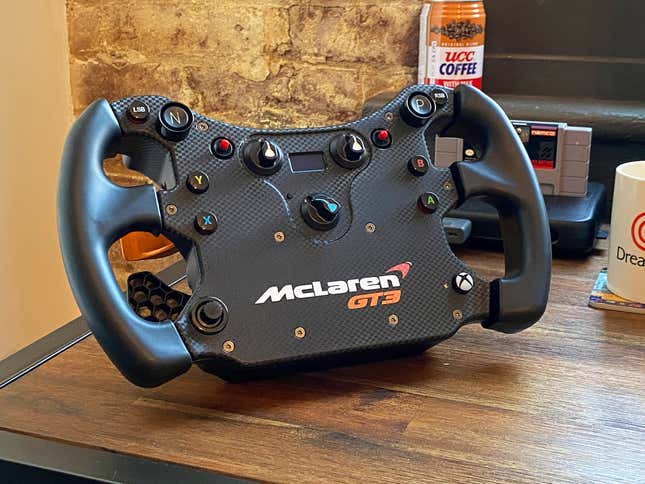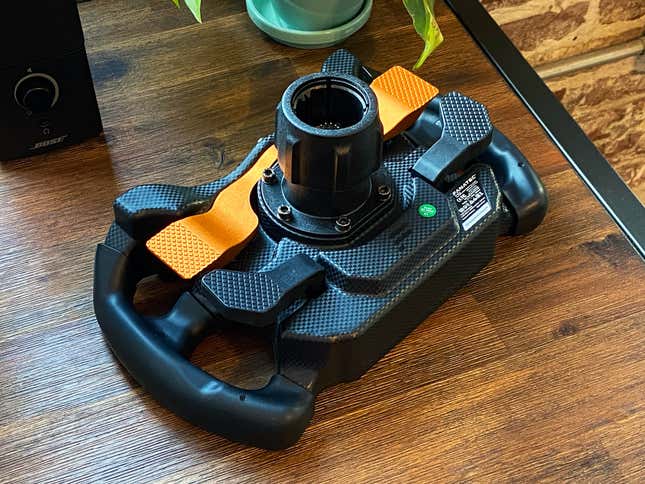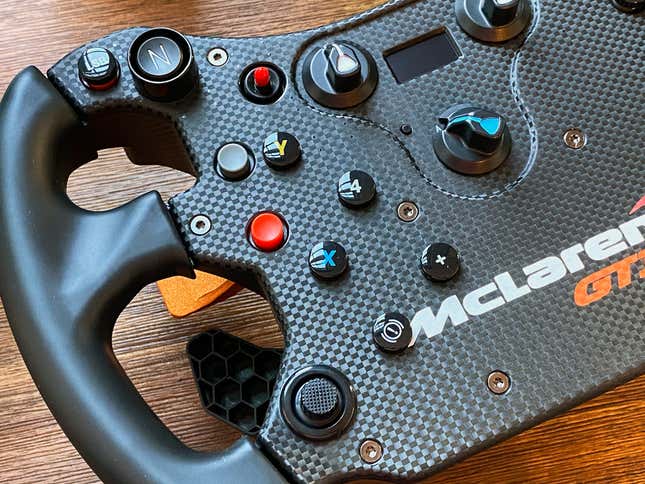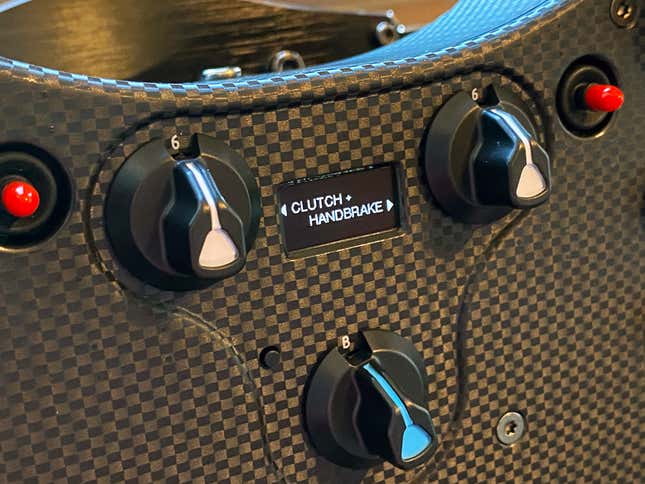Fanatec is a company known for sim racing equipment that tends to occupy the pricier end of the spectrum. When I say that, I’m not even referring to the upcoming BMW M4 GT3 wheel that’ll likely land in the quadruple digits. Most of the brand’s wheels are far cheaper than that. But they’re still $300 or $400 — and that’s on top of whatever you spend on the wheel base and pedals. Unlike Logitech and Thrustmaster’s equipment, Fanatec’s hardware is sold piecemeal.
Fanatec’s quality is often worth the dough. And the ability to pick and choose each bit of your rig in modular fashion allows you to cater the hardware to your preferences and the type of driving you do. If you tend to focus on sports car or open-wheel racing, you’ll probably take interest in Fanatec’s new officially licensed McLaren GT3 wheel.

This isn’t the first McLaren GT3 wheel Fanatec has released. The “V2" moniker denotes that this is a revision, essentially taking the company’s existing McLaren rim and making a few small but nonetheless notable changes. Priced at $199, it also happens to be one of the least expensive wheels in Fanatec’s catalog, which will certainly endear it to more budge-conscious sim racers. It’s not perfect, but for the price, it’s pretty damn close.
At the time of writing, the McLaren GT3 V2 is back-ordered via Fanatec’s website, with an estimated availability date of June 30.
Full disclosure: The McLaren GT3 V2 wheel we received for testing was provided by the fine folks at Fanatec, along with a ClubSport Wheel Base V2.5 ($550) and ClubSport V3 pedals ($360). If you were to purchase the setup I used for this review overall, it’d cost you $1,110. I tested the wheel with iRacing.
Compatibility
The McLaren GT3 V2 wheel is compatible with all of Fanatec’s current wheel bases, including the CSL Elite V1 and V1.1, ClubSport V2 and V2.5 (the one I’m using) and the direct-drive Podium DD1 and DD2.
However, the Podium bases will require the purchase of one additional part to make this wheel operate correctly. The McLaren GT3 V2 comes with a plastic quick release adapter that isn’t designed for the high torque the direct-drive Podium bases are capable of. If you happen to own a Podium DD1 or DD2, the McLaren GT3 V2 rim will still work with those bases out of the box, though you’ll need to purchase one of Fanatec’s $100 aluminum ClubSport quick release adapters to experience full feedback power.
Additionally, as is the case with most of Fanatec’s equipment, the McLaren GT3 V2 will work out of the box with PC and Xbox (including Series X and S) but must be connected via one of Fanatec’s few PlayStation-licensed wheel bases if you want to use it with PS4 and PS5. It’s a detail people who have assembled Fanatec setups are probably already aware of, but one that bears repeating anyway.
Design
Much like Fanatec’s first stab at this steering wheel, the McLaren GT3 V2 emulates the design of the wheel inside the 650S GT3 race car. It’s a replica based on CAD data, from the overall shape and ergonomics down to the size and positioning of the paddles, switches and dials.
One detail the most hardcore McLaren faithful may take issue with is that the newer 720S GT3 car uses a different wheel that is a bit slimmer in the center, with most of the buttons placed in rows running down the insides of the handles. That would seem to be a more thoughtful design, but alas, it’s not the one Fanatec has gone with here.

I’m not too bothered by that though. I’m more hampered by the sheer size of this wheel. While it is quite light due to the materials used — something we’ll cover in a bit — the 300 mm diameter of the McLaren GT3 V2 is similar to its real-life counterpart. And while that does make this wheel a full-scale replica, it also may put off sim racers with smaller hands and shorter arms, like yours truly. Personally I’d prefer a 270 mm diameter wheel, but of course, your mileage may vary.
As for those materials, the McLaren GT3 V2 is distinguished from most of Fanatec’s other wheels by the full plastic design of its body and super-grippy rubber handles. There’s no metal and certainly no Alcantara here, which may disappoint some. Many associate plastic with a toy-like feeling — a criticism you often see of cheaper wheel sets, like the Logitech G923 I reviewed a few months ago.
If you ask me, though, plastic in and of itself isn’t terrible. It’s all about the quality of that plastic, and how and where it’s applied. Fanatec’s done a brilliant job here, as the plastic used in this wheel is sturdy and not chintzy at all to the touch. The faux carbon-fiber weave texture is one of the better examples I’ve observed on anything from smartphones to car interiors. And while those rubber grips don’t feel as pleasant as suede, they absolutely get the job done in terms of keeping your hands in place. Overall, Fanatec struck a good balance between keeping costs down and quality high.

Where you will find some metal is on the paddle shifters, which brings us to one of the notable areas where Fanatec has improved the McLaren GT3 V2 over its predecessor. I never used that original model, but critics complained of flimsy feeling paddles with mushy action, rather than the precise click or sure chonk you’d prefer with every shift.
Fanatec’s swapped that shifter with a single piece of anodized aluminum that rocks on its center, with magnetic resistance for a strong tactile sensation. These “paddles” definitely feel heavier to slam than those I’ve used on other wheels, and the fact they’re actually one piece is a little strange at first. But you quickly get used to that.
Below the aluminum paddle rocker is another set of paddles, though these are made of plastic and have a range of motion more akin to analog triggers. They can be used as a replacement for analog pedals or for a few other purposes, depending on the software mode selected. These paddles have the cheapest feel of any part of the wheel, but they’re clad in a diamond-textured, soft-touch finish, which again, is good enough for the price point.
As far as the buttons and switches are concerned, they’re all solid and precise, particularly the “N” and “P” keys that have their own circular housing and are very hard to press without the necessary force. Fanatec thoughtfully supplies alternate button caps with iconography you’d actually expect to see on a racing wheel if the Xbox labels don’t do it for you.

The only real complaint I have concerning any of the interfaces is the FunkySwitch (yes, that’s actually what Fanatec calls it) rotary D-pad nub thing in the lower left-hand corner of the wheel. Now, many racing sims have an on-screen display that is perhaps best manipulated with a knob like this; iRacing, for example, has the standings and relative lap time board that can also be toggled to set your fuel and tire choices for your next pit stop. The FunkySwitch can be physically pushed left, right up and down — like a D-pad — but it can also be pressed in, like a button, and turned, like a rotary dial. That’s a lot of functions for one little nub. On paper, it seems awfully useful.
In practice, though, it’s far too easy to, say, nudge the knob to the left or right when you’re actually trying to push it in. The D-pad action is very vague and the knob itself has far too much play, which makes it a pain to use when you just want to peek at some information relevant to your race. It’s very finicky, and that’s certainly not the kind of additional stress anyone needs when driving.
Features And Software
Smack dab between all the fiddly knobs and things to press on the McLaren GT3 V2 is a 1-inch OLED screen. Most of the time this screen will convey your speed or current gear, depending on the particular game you’re playing. But turn the knob directly below it, and it’ll reveal four options that affect the aforementioned analog paddles on the back of the wheel.
Each setting on this knob changes what those paddles do. Setting A, called Clutch Bite Point mode, allows you to independently map the specific bite point to one of the paddles while mapping the full range of the clutch to the other — particularly useful for those seeking F1 style launches. Setting B divides the paddles into clutch and handbrake; Setting C is brake and throttle; and Setting D lets you designate the paddles as generic analog triggers that can then be bound to a specific function in game.

The inclusion of those multipurpose paddles and the ease with which you can modify their behavior makes for a really neat feature. I imagine the brake and throttle mode could be especially useful for someone who is unable to use a set of dedicated pedals.
The only software issue I encountered during my time with the McLaren GT3 V2 came when I attempted to update it via Fanatec’s firmware interface, ambiguously named the “Wheel Property Page.” While the process of updating the wheel hub and pedals was quick and painless, Fanatec’s software routinely lost connection with the McLaren wheel during the installation process. The update crashed the first handful of times I attempted it; each time it failed, I had to power cycle the base and reconnect it to my computer just so it could be recognized again. It seemed hopeless.
Eventually after the third time reinstalling Fanatec’s latest drivers, the wheel was mercifully able to update. I’m fortunate enough that the wheel worked with iRacing out of the box — so this was never a deal breaker for me — but updating a product like this shouldn’t come with so many headaches.
Verdict
With this revision, Fanatec has fixed the few issues plaguing the McLaren GT3 wheel while keeping it at a competitive price point. As such, it’s hard to argue against. If $200 is the max you’re willing to spend on a wheel and you’re looking for one with lots of customizable inputs, you can’t really go wrong with the GT3 V2.
The major, obvious caveat to that is that the GT3 V2 must fit the driving you prefer to do. Personally, if I was on a tight budget and only had the dough to spend on one steering wheel, I’d want a more conventional, circular rim that could serve both rally and circuit driving. But if you already have a basic wheel to depend on for everything else, Fanatec’s latest McLaren-branded rim is a worthy addition to your kit, small nitpicks aside.
